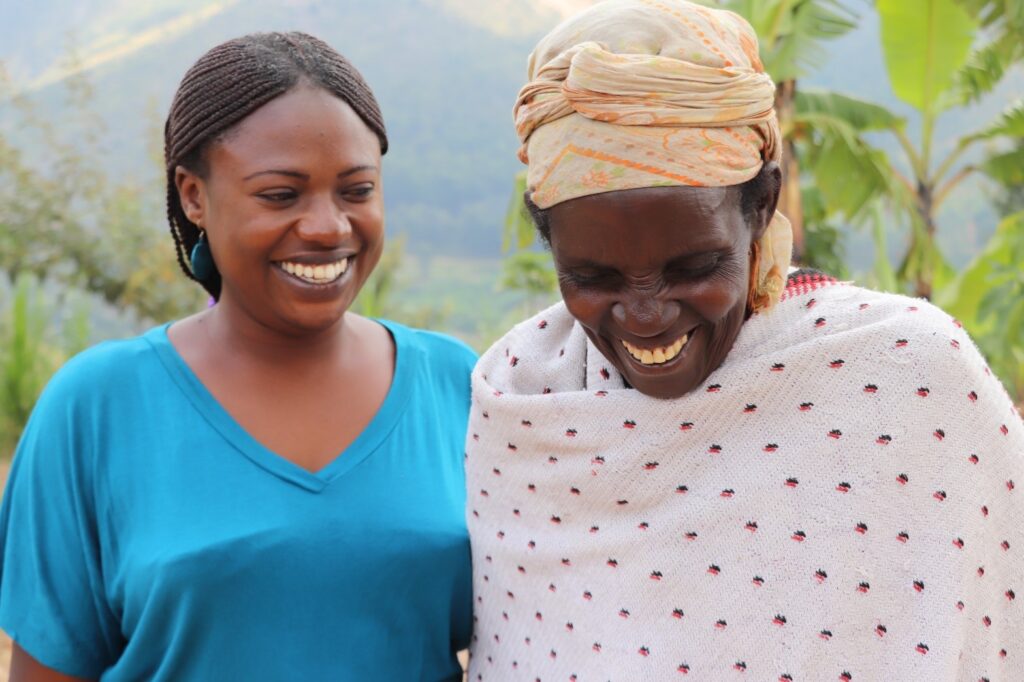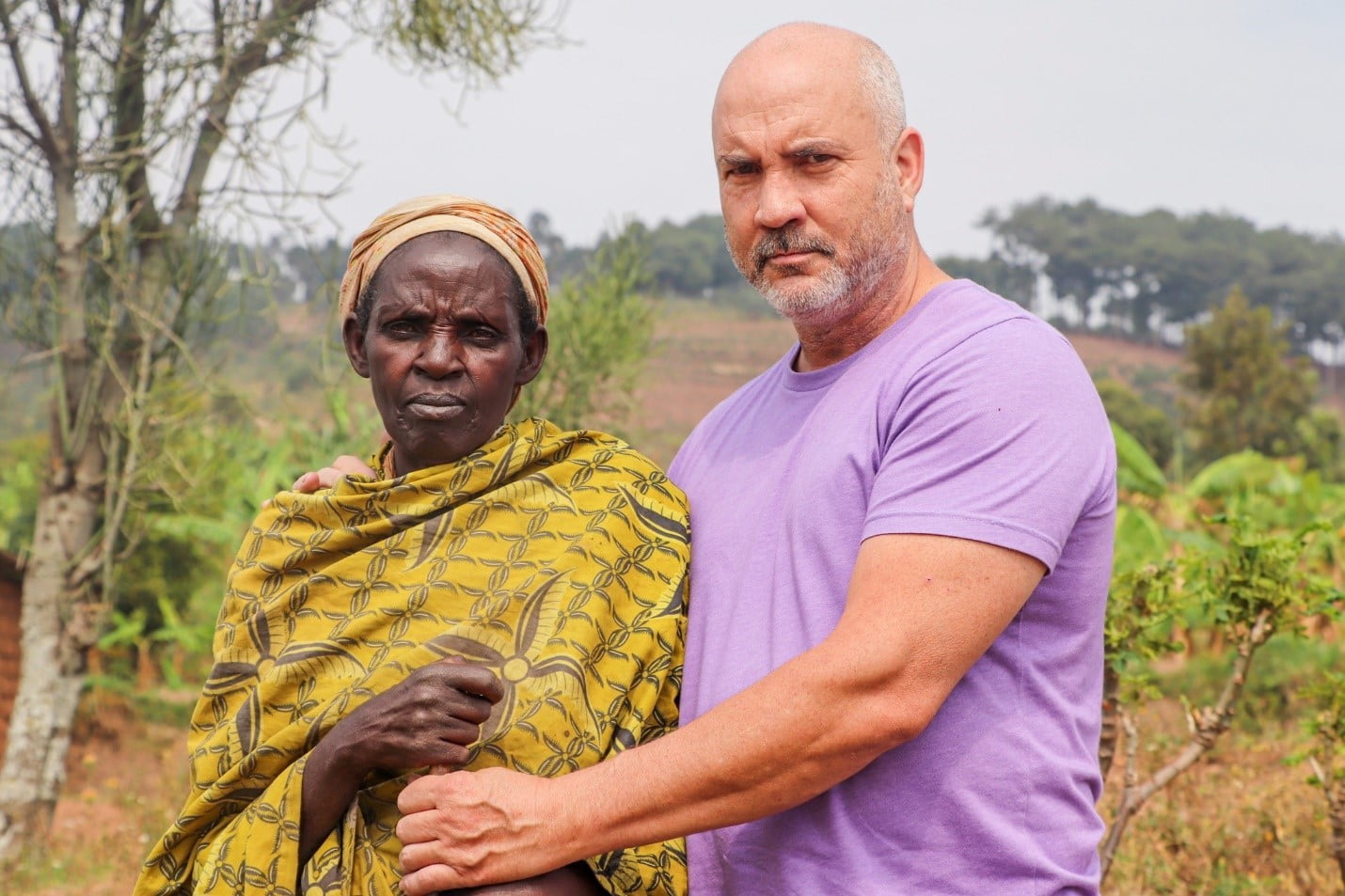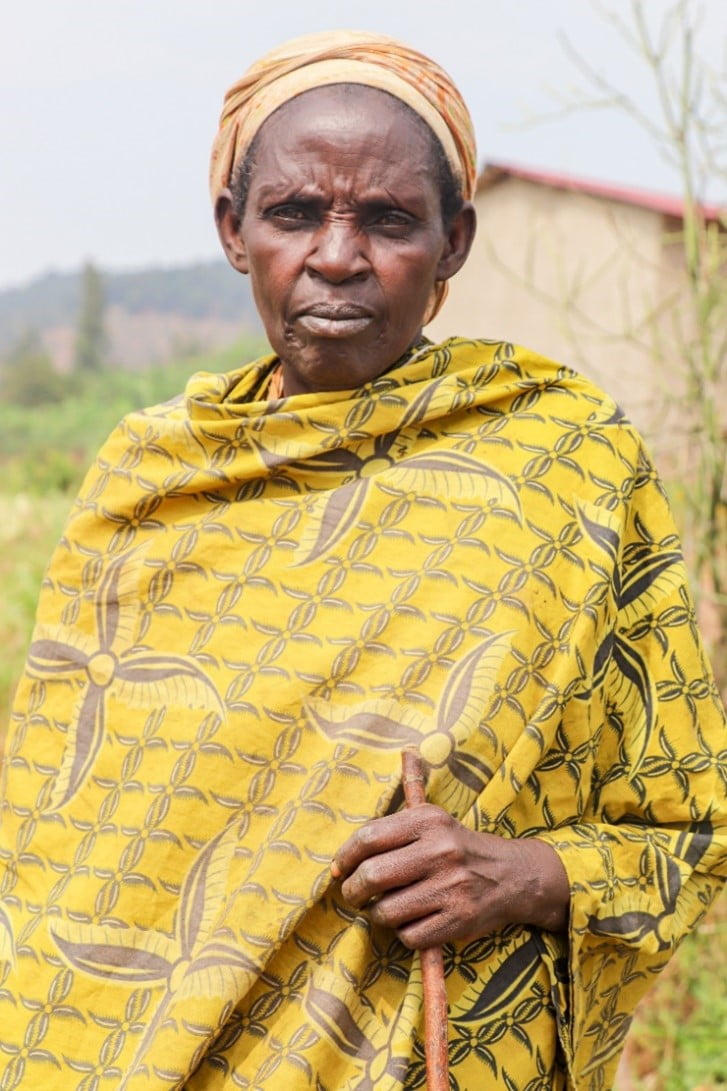The story of Mediatrice is a shining example

Alan's interpreters Claudine and Médiatrice.
“Sometimes when the earth turns it feels like that is what is happening to us, turning our lives around, not knowing when or if it will stop. Life seems to joke with us, and we can suffer because of it. But it is up to us to control our world and not allow our world to control us.”
When it comes to not knowing what is going on with someone on the basis of their outward appearance, the story of Mediatrice is a shining example. We met her while walking up a small mountainside outside of town. Our meeting was brief, but she was very kind and gracious, with a very gentle but full laugh, and she carried herself with as much dignity as anyone I have ever known. We said our greetings, took some pictures, and moved on.
We came across her again a few weeks later and she opened up about her life. As I listened to my interpreter Claudine and her talk, my focus turned towards recording her weaving the mat she was using for sleeping. The way she was weaving and talking you would have never guessed what she was actually saying. As my mother said after seeing the video, “she sounds so happy and content.” For me it was a very unique and interesting experience. For Claudine it was an opportunity to listen to another person’s story. For Mediatrice? I will let you see for yourself.
“I grew up as a charming young girl but that didn’t stop me from suffering from life.” When she was nineteen years old, a young man stole her from her home and lived with her without getting married. She eventually got pregnant, but the baby died during childbirth. She got pregnant a second time and gave birth to a daughter.

After traveling to her parents’ home one day, she realized she had a tumor on her foot which left her unable to walk. While she was staying with her parents, she found out that her daughter’s father had left her for another woman. When Mediatrice got well, she returned to him to make sure that what she had heard was true. “I was surprised to see my father-in-law welcoming me with words that hurt my heart. He said I got the gift I was looking for. He was complaining that I wasn’t engaged, that I had no other share in the family except for my child. There was a crowd of people there that he had invited. I felt ashamed and went home.”
Some years later Mediatrice’s older sister died, leaving five children behind. The husband of her sister married another woman, but the marriage didn’t last because the lady wanted to live in rich conditions, and it was impossible to do so where they were. “She wanted to live like muzungu,” Mediatrice said.
In Rwandan culture it is known that if your wife dies you will marry the sister, and if a wife loses her husband the husband’s brother marries his wife. Mediatrice’s sister’s husband came to her and asked her for her hand in marriage. Because he was giving a dowry her parents accepted him without question. Mediatrice went with the man and lived in their home, giving birth to a son. Her husband died nine years later.
Two years after the death of her husband some people convinced her elder sister’s children to try and kill her so that they could take her property. “Bernard, my sister’s son, would stay in the house where I was staying, and because he was a businessman, it was said that he was the one they wanted to kill me.”
Her death was planned, “but it was God’s plan to save me.” One of the men who was in the group that was paid to kill her came to meet her and said, “since you have arrived here, you have done nothing wrong to anyone. Our children used to come here, and you would feed them. And even though we are the elders you have been kind to us. That is why I warn you. I don’t know the day, but they want to kill you.” She returned home and went to bed but was unable to sleep. The next day she took the child and some clothes and left, returning to stay with her parents as she was “fed up with men.”
One day, a friend of Mediatrice’s friend insisted that she come to visit her as she was sick. When she arrived, she found that her friend had gone to the hospital. It started raining so her friend’s husband asked her to come inside to keep dry. The man immediately took her by force and raped her. “My friend treated me like I betrayed her, while it was her that betrayed me. That is how I got my third child.”

Mediatrice continued to live with her parents until the father of her first child returned to take their daughter, as she was now grown. Her parents told the man that he could take the child but not at the moment because it was late. They asked him to spend the night, and this was the tragedy of Mediatrice again. “The ancient culture was not simple at all. They asked me to sleep with him because we had been a couple before. And that is how I got my fourth child, and she is the one who remembers me as her mother.”
Eventually the time came when Mediatrice’s parents passed away. She felt alone, especially since only one of her siblings remained, and her children went into their own homes. “I lived as if I was alone, even though I didn’t have anything visible. I gave what I had, though. I would open my door to people who were coming from the mountain to pray and give them water. Some of them would stay the night even though my neighbors thought I was crazy. But as they say, be kind and nice to everyone without thinking of getting anything in return.”
Mediatrice escaped death because of the kindness she expressed to her neighbors. Now she lives in a one-bedroom home with a roof that was paid for by someone who happened to pass by. “A dark-skinned big boy came and parked in front of my house. He asked me to accept money, saying “Here, it is for you.’ You will pay for the roof of your house.’ He gave me 100000 Rwandan Francs. I was surprised.”
Mediatrice now has a song that comforts her and makes her happy. It says, “what I have done for you, my Lord, so be kind with me. Nothing apart from your kindness, my Lord. Others passed away. My parents and my siblings, but you still protect me. That is why I feel happy, and I feel great need to praise you, my Lord.”
Despite her story she came to joke about life without dwelling in her hurt, all this due to the kindness and love of God.
Alan Lane

